The Springboks’ quarter-final was won on brutal, dominant defence. The next focus will be on improved execution, writes CRAIG LEWIS.
Yes, there were some seriously jittery moments for the Springboks in the first half against Japan, but ultimately it was their power game that came to the fore to lay the foundation for the expected victory.
To the credit of Japan and their coaching staff, the host nation certainly had some tricks up their sleeves, with quickfire play at the set pieces and a few well-weighted cross kicks working a treat early on.
When Japan turned up the pace with ball in hand, and used their short passes to great effect, the Bok defence looked like it could be fractured.
And yet, it simply wasn’t.
Despite all the fire and brimstone from Japan, the Boks held their defensive shape, and regularly forced their attacking opponents to turn back infield.
More often than not, Japan players were then met with massive, brutal, dominant tackles. It was the sort of defence that denied Japan front-foot momentum, and allowed the Springboks to hang in the game.
What the Boks also did well was to turn to the strength of their maul to slowly but surely amplify the slow-poison power game that gradually took Japan and their vociferous fans out of the equation.
REPORT: Forwards fire to offset backline blunders
In all, the Springboks had to make a whopping 140 tackles compared to 91 from Japan, but missed just 20 for an 88% tackle success rate. Crucially, the fact of the matter is that a large percentage of those tackles were dominant hits.
Among the standout defensive performers, Lood de Jager completed 15 tackles and missed not one, while Damian de Allende made 14 tackles, with Siya Kolisi and Cheslin Kolbe completing 11 each.
It was all too much for Japan to handle, and ultimately the result went the expected way.
Yet, what the Boks have to do in the lead-up to their semi-final against Wales – and potentially a final against England or the All Blacks – is to ensure they improve their execution with ball-in-hand.
On more than one occasion in the first half, the Springboks turned golden points-scoring opportunities as a result of poor decision-making, abject handling or inaccurate kicking.
Willie le Roux, in particular, endured a bit of a nightmare performance, and there may well be some thought given to restructuring the Springboks’ back three for the semi-final.
On the whole, though, the Boks will be satisfied with a win based on a power game, and particularly savage defence, but they simply have to improve their execution on attack if they hope to go all the way at this World Cup.
Photo: Richard Heathcote – World Rugby/World Rugby via Getty Images





